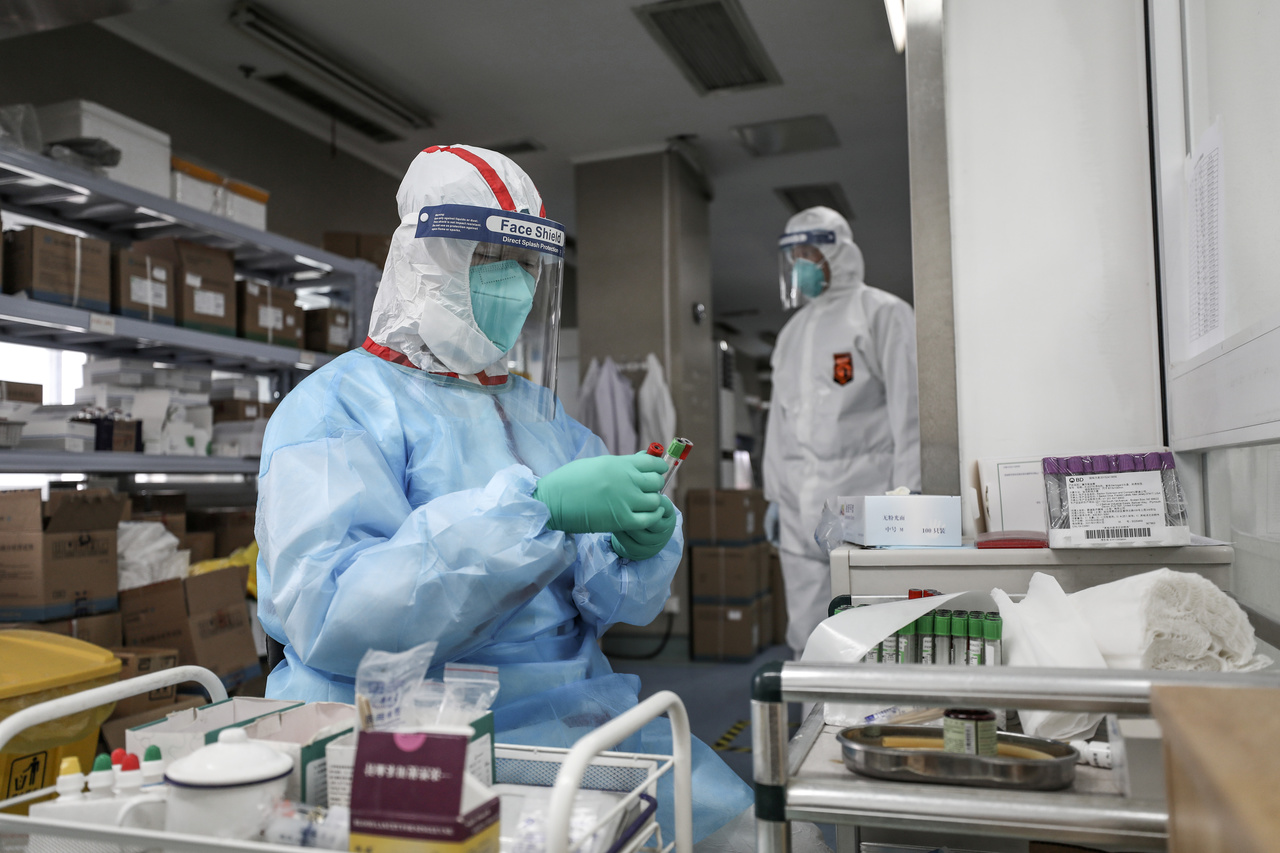The Asian Voice
How bioinformatics bolster the fight against the coronavirus: Jakarta Post contributor
In the article, the writer says that extensive bioinformatics research conducted by Chinese scientists should be appreciated as it uncovered biological sequences that have served as crucial information for scientists to develop definite drugs, vaccines and solid diagnostic tools for the virus.
Sign up now: Get insights on Asia's fast-moving developments

A medical worker in protective suit prepares for an RNA test at Jinyintan hospital in Wuhan, China, on Feb 13, 2020.
PHOTO: REUTERS
JAKARTA (THE JAKARTA POST/ASIA NEWS NETWORK) - The Chinese, regional and global situation with regard to the new coronavirus, Covid-19, remains worrisome.
Singapore recently increased their alertness level to "orange" in order to face this epidemiological crisis. The World Health Organisation (WHO) is providing daily reports on the spread of the virus, initially called 2019-nCov, on its website.
As of Feb 11, more than 43,000 people had been infected and over 1,000 deaths had been recorded, mostly in China. The WHO and other experts still wonder why Covid-19 has remained undetected in Indonesia.
The government has evacuated Indonesian citizens from Wuhan, the origin of the virus, to Natuna Island for quarantine.
As the world lingers in crisis, global bioinformaticians, especially the Chinese, are trying their best to win the humanitarian and scientific battle against the deadly pathogen.
Although most of the time they are working behind closed and confined doors, they have provided critical information to assist medical schools throughout the world in developing drugs, diagnostic tools and, eventually, a vaccine to beat Covid-19.
The very first bioinformatic breakthrough in this outbreak was the detailing of the new coronavirus' biological sequence.
The genome of Covid-19 and the crystal structure of its protease enzyme have already been sequenced and elucidated by a consortium of Chinese universities and research institutes.
The protease structure is attached with the N3 inhibitor and this is crucial information for the drug development effort. The sequence is a starting point in developing drugs, diagnostic tools and a vaccine for the dangerous virus.
The effort to find the genes that are responsible for viral replication and the protein responsible for the host cell attachment have benefited from this sequencing.
Based on that preliminary information, scientists have developed diagnostic tools with reverse transcription polymerase chain reaction (RT-PCR) endorsed by the WHO.
The primers of the PCR protocol were designed with tools that were based upon the bioinformatics sequence alignment method. This demonstrates that bioinformatics played a role in the very early efforts to develop the lab protocol for diagnosing Covid-19. Developing drugs and especially vaccines will be a different game as it will be more challenging.
Based on recommendations from scientists from the Public Health Clinical Center at Fudan University, China, utilising existing drugs lopinavir or ritonavir, for instance, could be a viable option, although it should be tested in clinical trial.
The vaccine development effort is about to start. As worldwide lead compounds repositories such as pubchem (a database of chemical molecules) and drug bank are available, scientists can leverage machine-learning-based computational methods to alter drug candidates swiftly.
This can be done by modifying the chemical structure of the existing coronavirus drugs with computational chemistry tools. The next stage will be conducting massive molecular simulations using supercomputers to obtain the best lead compounds to be extrapolated as drug candidates in the wet laboratory setting.
Modern supercomputers can simulate the complexity of the biochemical reaction in the cell, so they will have a stark resemblance to the wet lab environment.
However, in the present emergency situation, quicker alternatives to peer-reviewed scientific journals are needed as disseminators of research results. Life sciences preprint servers bioRxiv and medRxiv, for instance, have played their role well as databases of open science to hasten the dissemination of research results in a time of emergency.
While China employs its best scientific machinery to face this terrible crisis, some people have engaged in racist fearmongering. Racial slurs stemming from Covid-19 infections facing China and overseas Chinese are unscientific, inhumane and unjust.
It should be halted immediately and the world should focus on the things that are important.
China and the rest of the world need a scientific solution to the new coronavirus infection, not useless and painful racial humiliation or xenophobic sentiments.
Thus, the extensive and super-fast bioinformatics research that has been conducted by Chinese scientists should be appreciated because it uncovered biological sequences that have served as crucial information for the WHO and other scientists throughout the world in the fight to develop definite drugs, vaccines and solid diagnostic tools for the virus.
Based on the Chinese experience, in case of any dangerous infectious disease, Indonesia should develop a fine-grained standard operating procedure and manual procedure that can establish and disseminate biological sequences as soon as possible so the WHO and the rest of the world can help us quickly.
The Health Ministry and especially the Research and Technology Ministry, which will be the supervisor of all public research institutes in the country including health-related ones, should think about the need for quick genetic sequencing because nobody knows what the future will hold.
The very preliminary step that the research ministry should take is the establishment of a national sequences repository like the National Centre for Biotechnology Information (NCBI) in the United States.
This central repository will facilitate strong coordination with the WHO and other prominent academics and research institutes in the world in a time of epidemiological crisis.
The writer is the Head of the Bioinformatics Department at the Indonesia International Institute for Life Sciences. The Jakarta Post is a member of The Straits Times media partner Asia News Network, an alliance of 24 news media organisations.


